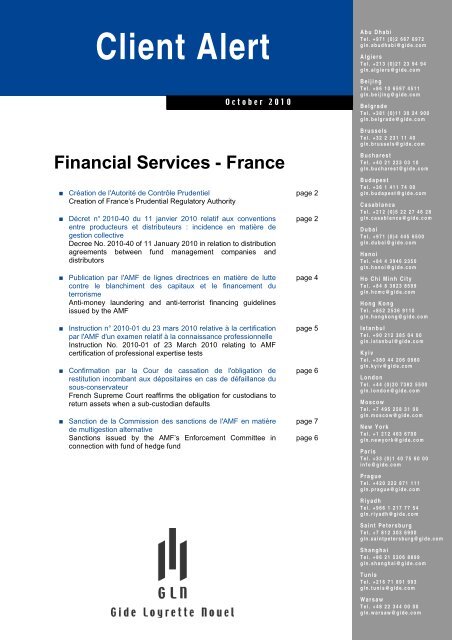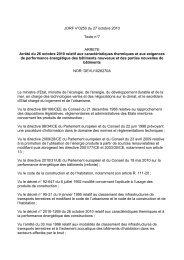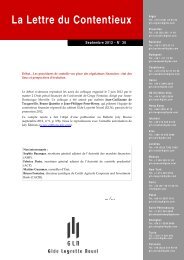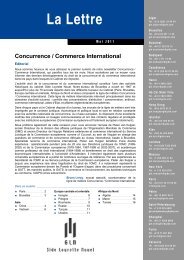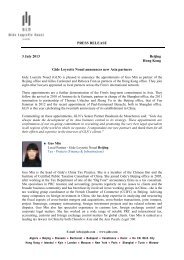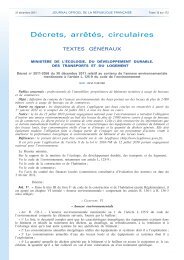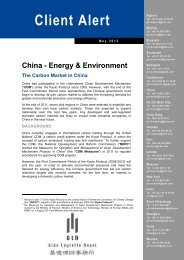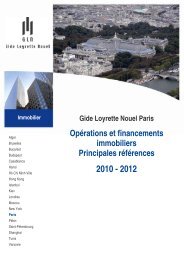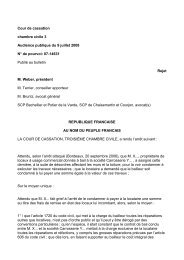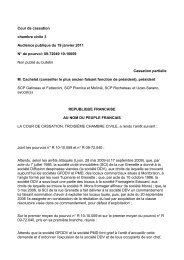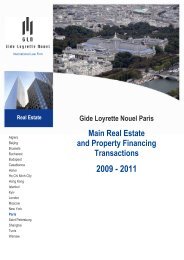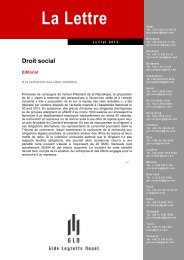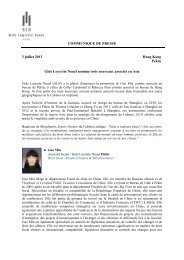Client Alert - Gide Loyrette Nouel
Client Alert - Gide Loyrette Nouel
Client Alert - Gide Loyrette Nouel
Create successful ePaper yourself
Turn your PDF publications into a flip-book with our unique Google optimized e-Paper software.
1.<br />
<strong>Client</strong> <strong>Alert</strong><br />
Financial Services - France<br />
Création de l'Autorité de Contrôle Prudentiel<br />
Creation of France’s Prudential Regulatory Authority<br />
October 2010<br />
Décret n° 2010-40 du 11 janvier 2010 relatif aux conventions<br />
entre producteurs et distributeurs : incidence en matière de<br />
gestion collective<br />
Decree No. 2010-40 of 11 January 2010 in relation to distribution<br />
agreements between fund management companies and<br />
distributors<br />
Publication par l'AMF de lignes directrices en matière de lutte<br />
contre le blanchiment des capitaux et le financement du<br />
terrorisme<br />
Anti-money laundering and anti-terrorist financing guidelines<br />
issued by the AMF<br />
Instruction n° 2010-01 du 23 mars 2010 relative à la certification<br />
par l'AMF d'un examen relatif à la connaissance professionnelle<br />
Instruction No. 2010-01 of 23 March 2010 relating to AMF<br />
certification of professional expertise tests<br />
Confirmation par la Cour de cassation de l'obligation de<br />
restitution incombant aux dépositaires en cas de défaillance du<br />
sous-conservateur<br />
French Supreme Court reaffirms the obligation for custodians to<br />
return assets when a sub-custodian defaults<br />
Sanction de la Commission des sanctions de l'AMF en matière<br />
de multigestion alternative<br />
Sanctions issued by the AMF’s Enforcement Committee in<br />
connection with fund of hedge fund<br />
page 2<br />
page 2<br />
page 4<br />
page 5<br />
page 6<br />
page 7<br />
page 6<br />
Abu Dhabi<br />
Tel. +971 (0)2 667 6972<br />
gln.abudhabi@gide.com<br />
Algiers<br />
Tel. +213 (0)21 23 94 94<br />
gln.algiers@gide.com<br />
Beijing<br />
Tel. +86 10 6597 4511<br />
gln.beijing@gide.com<br />
Belgrade<br />
Tel. +381 (0)11 30 24 900<br />
gln.belgrade@gide.com<br />
Brussels<br />
Tel. +32 2 231 11 40<br />
gln.brussels@gide.com<br />
Bucharest<br />
Tel. +40 21 223 03 10<br />
gln.bucharest@gide.com<br />
Budapest<br />
Tel. +36 1 411 74 00<br />
gln.budapest@gide.com<br />
Casablanca<br />
Tel. +212 (0)5 22 27 46 28<br />
gln.casablanca@gide.com<br />
Dubai<br />
Tel. +971 (0)4 445 6500<br />
gln.dubai@gide.com<br />
Hanoi<br />
Tel. +84 4 3946 2350<br />
gln.hanoi@gide.com<br />
Ho Chi Minh City<br />
Tel. +84 8 3823 8599<br />
gln.hcmc@gide.com<br />
Hong Kong<br />
Tel. +852 2536 9110<br />
gln.hongkong@gide.com<br />
Istanbul<br />
Tel. +90 212 385 04 00<br />
gln.istanbul@gide.com<br />
Kyiv<br />
Tel. +380 44 206 0980<br />
gln.kyiv@gide.com<br />
London<br />
Tel. +44 (0)20 7382 5500<br />
gln.london@gide.com<br />
Moscow<br />
Tel. +7 495 258 31 00<br />
gln.moscow@gide.com<br />
New York<br />
Tel. +1 212 403 6700<br />
gln.newyork@gide.com<br />
Paris<br />
Tel. +33 (0)1 40 75 60 00<br />
info@gide.com<br />
Prague<br />
Tel. +420 222 871 111<br />
gln.prague@gide.com<br />
Riyadh<br />
Tel. +966 1 217 77 54<br />
gln.riyadh@gide.com<br />
Saint Petersburg<br />
Tel. +7 812 303 6900<br />
gln.saintpetersburg@gide.com<br />
Shanghai<br />
Tel. +86 21 5306 8899<br />
gln.shanghai@gide.com<br />
Tunis<br />
Tel. +216 71 891 993<br />
gln.tunis@gide.com<br />
Warsaw<br />
Tel. +48 22 344 00 00<br />
gln.warsaw@gide.com
2.<br />
Création de l'Autorité de Contrôle Prudentiel<br />
Créée par l'ordonnance n° 2010-76 du 22 janvier 2010, et<br />
par les décrets d'application n° 2010-217 et n° 2010-218<br />
du 7 mars 2010, l'Autorité de Contrôle Prudentiel (l'"ACP")<br />
est une autorité administrative indépendante née de la<br />
fusion entre la Commission bancaire, l'Autorité de contrôle<br />
des assurances et des mutuelles, le Comité des<br />
entreprises d'assurance et le Comité des établissements<br />
de crédit et des entreprises d'investissement.<br />
Aux termes de l'article L. 612-1 du Code monétaire et<br />
financier (le "Code"), l'ACP a pour mission de veiller "à la<br />
préservation de la stabilité du système financier et à la<br />
protection des clients, assurés, adhérents et<br />
bénéficiaires des personnes soumises à son contrôle".<br />
Placée sous la tutelle de la Banque de France, elle n'a<br />
pas de personnalité morale, mais est dotée de la<br />
capacité d'ester en justice dans le cadre de procédures<br />
concernant son champ d'activité. Elle est composée d'un<br />
collège, de deux sous-collèges sectoriels compétents<br />
respectivement en matière d'assurance et de banque,<br />
d'une commission des sanctions, ainsi que de<br />
commissions temporaires.<br />
Son contrôle s'exerce notamment sur les établissements<br />
de crédit, les entreprises d'investissement autres que les<br />
sociétés de gestion de portefeuille, les établissements de<br />
paiement et les entreprises d'assurance et de<br />
réassurance (articles L. 612-1 à L. 612-3 du Code).<br />
Dans le cadre de sa mission, l'ACP dispose d'un pouvoir<br />
de décisions individuelles, parmi lesquelles les<br />
autorisations ou agréments, d'un pouvoir de contrôle,<br />
d'un pouvoir de prendre des mesures de police<br />
administrative et d'un pouvoir de sanction. A la différence<br />
de l'Autorité des marchés financiers (l'"AMF"), elle ne<br />
dispose pas de pouvoir réglementaire. Elle exerce son<br />
autorité parallèlement à celle de l'AMF, dont le champ de<br />
compétence reste inchangé. Un pôle commun a été<br />
conventionnellement créé le 30 avril 2010 entre l'ACP et<br />
l'AMF en vue d'une coopération active, notamment en<br />
matière de la commercialisation des produits financiers.<br />
Décret n° 2010-40 du 11 janvier 2010 relatif aux<br />
conventions entre producteurs et distributeurs :<br />
incidence en matière de gestion collective<br />
Le décret n° 2010-40 (le "Décret") vient préciser les<br />
dispositions de l'ordonnance n° 2008-1271 du<br />
5 décembre 2008 régissant les conventions conclues<br />
entre producteurs et distributeurs d'instruments<br />
financiers (l'"Ordonnance").<br />
Rappelons que les dispositions du nouvel article L. 533-<br />
13-1 du Code issues de l'Ordonnance visent à clarifier la<br />
responsabilité respective des sociétés de gestion et des<br />
Creation of France’s Prudential Regulatory Authority<br />
Created pursuant to Ordinance No. 2010-76 of 22 January<br />
2010 and Decree No. 2010-218 of 7 March 2010, France’s<br />
new Prudential Regulatory Authority (Autorité de Contrôle<br />
Prudentiel, hereafter the "ACP") is an independent<br />
regulatory body formed by the merger of the Banking<br />
Commission, the Insurance and Mutual Companies<br />
Regulatory Authority, the Insurance Companies<br />
Committee, and the Credit Institutions and Investment<br />
Firms Committee.<br />
Pursuant to Article L. 612-1 of the French Financial and<br />
Monetary Code (the “Code”), the mandate of the ACP is to<br />
“safeguard the financial system and protect consumers,<br />
policyholders, members and beneficiaries of the<br />
institutions placed under its regulatory jurisdiction.” The<br />
ACP is not a legal entity; it is under the control of the Bank<br />
of France, France’s central bank. The ACP can, however,<br />
bring an action in a court of law in cases within its<br />
jurisdiction. The ACP is made up of a board of trustees,<br />
two subcommittees - one specialized in insurance and the<br />
other in banking services - and an enforcement committee,<br />
as well as ad-hoc committees.<br />
The ACP has broad regulatory jurisdiction over credit<br />
institutions, investment firms other than portfolio<br />
management companies, payment service providers, as<br />
well as insurance and reinsurance companies (pursuant to<br />
Articles L. 612-1 to L. 612-3 of the Code).<br />
The ACP has specific decision-making authority which<br />
includes authorisations and licensing, regulatory oversight,<br />
the ability to take preventive measures and the authority to<br />
impose sanctions. Unlike the Financial Markets Authority<br />
(the “AMF”), it does not have any rule-making powers. It<br />
exercises its authority alongside the AMF whose areas of<br />
responsibility are unchanged by the new regulatory body.<br />
On 30 April 2010, the ACP and the AMF created a joint<br />
body to pursue an active cooperation, especially with<br />
regard to the sale of financial products and services.<br />
Decree No. 2010-40 of 11 January 2010 in relation to<br />
distribution agreements between fund management<br />
companies and distributors<br />
Decree No. 2010-40 (the “Decree”) clarifies the provisions<br />
relating to agreements entered into between fund<br />
management companies and distributors as set forth in<br />
Ordinance No. 2008-1271 of 5 December 2008 (the<br />
“Ordinance”).<br />
The purpose of the new Article L. 533-13-1 of the Code is<br />
to clarify the respective responsibilities of portfolio<br />
management companies and distributors when it comes to<br />
marketing materials that they provide to potential investors<br />
in mutual funds and real estate investment funds, as well
3.<br />
distributeurs s'agissant des documents publicitaires<br />
remis aux souscripteurs potentiels dans le cadre de la<br />
commercialisation des parts et actions d'OPCVM et<br />
d'OPCI, ainsi que de tous instruments financiers faisant<br />
l'objet d'une offre au public et donnant lieu à la<br />
publication de documents d'information.<br />
L'entrée en vigueur de ce dispositif était suspendue à la<br />
publication d'un décret d'application devant préciser son<br />
champ d'application s'agissant des distributeurs et des<br />
instruments financiers concernés ainsi que les<br />
obligations minimales à la charge respective des<br />
distributeurs et des sociétés de gestion de portefeuille.<br />
Le Décret, dont les dispositions sont codifiées aux<br />
articles R. 533-15, R. 533-16 et R. 541-10 du Code,<br />
confirme en premier lieu que toute convention de<br />
distribution doit faire l'objet d'un contrat écrit entre les<br />
sociétés de gestion et les distributeurs avec qui les<br />
sociétés de gestion sont en relation directe.<br />
Conformément au nouvel article R. 533-15 1° du Code,<br />
les conventions de distribution doivent comprendre une<br />
obligation à la charge des distributeurs de soumettre à la<br />
société de gestion tout projet de document publicitaire,<br />
quel que soit le support, qu'ils ont établi ainsi que toute<br />
modification qu'ils entendent apporter à ces documents<br />
préalablement à leur diffusion. Les distributeurs ne<br />
peuvent remettre aux souscripteurs potentiels que les<br />
seuls documents publicitaires préalablement approuvés<br />
par la société de gestion.<br />
Trois obligations devant nécessairement apparaître dans<br />
le corps des conventions de distribution sont mises à la<br />
charge des sociétés de gestion de portefeuille (article R.<br />
533-15 2° du Code) :<br />
elles doivent mettre à disposition des distributeurs les<br />
prospectus complets des OPCVM, ainsi que toute<br />
mise à jour ;<br />
elles sont tenues de transmettre, éventuellement<br />
sous forme de fiches de présentation, les<br />
informations nécessaires à l'appréciation de<br />
l'ensemble des caractéristiques financières de<br />
l'instrument financier, tant par les distributeurs que<br />
par les souscripteurs potentiels, ainsi que la mise à<br />
jour systématique de ces informations ;<br />
les sociétés de gestion sont tenues de s'assurer de la<br />
conformité de tout projet de document publicitaire qui<br />
leur est préalablement soumis au prospectus complet.<br />
S'agissant du champ d'application rationae personae, les<br />
obligations résultant de l'Ordonnance et du Décret<br />
incombent non seulement aux distributeurs ayant la<br />
qualité de prestataire de services d'investissement mais<br />
également aux conseillers en investissements financiers<br />
as in connection with the marketing of financial instruments<br />
subject to a public offer and for which information<br />
documents are issued.<br />
The entry into force of this provision had been subject to<br />
the publication of a decree specifying its scope with<br />
respect to the distributors and the financial instruments in<br />
question as well as the minimal obligations applicable to<br />
distributors and fund management companies.<br />
The Decree, whose provisions are codified in Articles R.<br />
533-15, R. 533-16, R. 541-10 of the Code, first confirms that<br />
all distribution agreements between fund management<br />
companies and distributors must be by way of written<br />
contract.<br />
Pursuant to new Article R. 533-15(1) of the Code,<br />
distribution agreements must include an obligation for<br />
distributors to submit all draft versions of marketing<br />
materials created by them to the fund management<br />
companies, regardless of their format, as well as any<br />
proposed changes to such materials before their actual<br />
distribution. Distributors can only give potential investors<br />
advertising materials that have been pre-approved by fund<br />
management companies.<br />
All distribution agreements must also contain three<br />
obligations for fund management companies (Article R.<br />
533-15(2) of the Code):<br />
they are required to give distributors the fund's full<br />
prospectuses and any updated versions;<br />
they are required to provide, where possible in the form<br />
of fact sheets, the information necessary for distributors<br />
and potential investors to assess all the financial<br />
characteristics of the financial instruments, and routine<br />
updates of such information;<br />
fund management companies are required to ensure<br />
that all draft advertising materials submitted to them<br />
are consistent with the full prospectus of the relevant<br />
funds.<br />
In terms of the entities covered by the new provisions, the<br />
obligations created by the Ordinance and the Decree apply<br />
not only to distributors licensed as investment services<br />
providers, but also to financial services advisors (Conseillers<br />
en Investissements Financiers) who, for purposes of this<br />
new legislation, are treated as investment services providers<br />
(Article R. 514-10 of the Code).<br />
So far as jurisdictional scope is concerned, the position of<br />
the French authorities seems to be to consider that these<br />
obligations are applicable when the mutual funds or real<br />
estate investment funds are marketed in France.
4.<br />
qui sont assimilés, pour les besoins de ce nouveau<br />
dispositif, aux prestataires de services d'investissement<br />
(article R. 514-10 du Code).<br />
S'agissant du champ d'application rationae loci, la<br />
position des autorités françaises semble être de<br />
considérer que ces obligations sont applicables dès lors<br />
que l'OPCVM et l'OPCI sont commercialisés en France.<br />
S'agissant des instruments financiers, le Décret prévoit<br />
deux exclusions. En premier lieu, le dispositif n'est pas<br />
applicable "aux instruments financiers exclusivement<br />
destinés à des investisseurs qualifiés ou à un cercle<br />
restreint d'investisseurs au sens du II de l'article L. 411-<br />
2" (article R. 533-16 1° du Code). Cette exemption liée à<br />
l'existence d'un placement privé ne devrait avoir que peu<br />
d'incidence s'agissant des OPCVM et des OPCI, même<br />
les parts et actions d'OPCVM réservés à certains<br />
investisseurs ainsi que les parts et actions d'OPCI<br />
institutionnels étant susceptibles d'être souscrites par<br />
des investisseurs n'ayant pas tous la qualité<br />
d'investisseur qualifié au sens de l'article L. 411-2 II du<br />
Code.<br />
Par ailleurs, les instruments financiers proposés dans le<br />
cadre des mécanismes d'intéressement, de participation<br />
et d'épargne salariale ne sont pas soumis aux<br />
obligations exposées ci-dessus (article R. 533-16 2° du<br />
Code). Cette exclusion devrait bénéficier aux parts et<br />
actions de FCPE.<br />
Publication par l'AMF de lignes directrices en<br />
matière de lutte contre le blanchiment des capitaux<br />
et le financement du terrorisme<br />
Dans le cadre de la mise en œuvre de la transposition<br />
en droit français de la directive européenne 2005/60/CE<br />
dite "troisième directive anti-blanchiment" et de sa<br />
directive d'application 2006/70/CE, par l'ordonnance<br />
n° 2009-104 du 30 janvier 2009 et de ses textes<br />
d'application, l'AMF a élaboré deux documents, dont l'un<br />
en collaboration avec TRACFIN, publiés le 15 mars<br />
2010, afin de compléter et préciser sa doctrine en<br />
matière de lutte contre le blanchiment de capitaux et le<br />
financement du terrorisme. Ces lignes directrices<br />
s'adressent à l'ensemble des entités réglementées<br />
relevant de la compétence de l'AMF comprenant les<br />
sociétés de gestion de portefeuille, les conseillers en<br />
investissements financiers, les dépositaires centraux et<br />
les gestionnaires de systèmes de règlement et de<br />
livraison.<br />
Les "Lignes directrices conjointes de l'AMF et de TRACFIN<br />
sur l'obligation de déclaration en matière de lutte contre le<br />
blanchiment et le financement du terrorisme" explicitent<br />
l'extension du champ déclaratif (notamment à la fraude<br />
fiscale) et les attentes de TRACFIN tant en matière de<br />
As regards the financial instruments covered by this new<br />
regulation, the decree provides for two exclusions.<br />
First, the enacting terms do not apply “to financial<br />
instruments intended solely for professional investors or for<br />
a restricted circle of investors as defined in Article L. 411-<br />
2” (Article R. 533-16(1) of the Code). With respect to<br />
mutual funds and real estate investment funds, this<br />
exemption, which is in the context of a private placement,<br />
should have only a limited impact. Indeed, even shares in<br />
institutional funds and institutional real estate funds may<br />
be purchased by investors who are not professional<br />
investors as defined in Article L. 411-2 II of the Code.<br />
Furthermore, financial instruments offered in connection<br />
with employee incentive schemes, stock ownership<br />
programmes and employee savings schemes are not<br />
subject to the obligations described above (Article R. 533-<br />
16(2) of the Code). Shares in employee investment funds<br />
(FCPE) should also qualify for this exemption.<br />
Anti-money laundering and anti-terrorist financing<br />
guidelines issued by the AMF<br />
As part of the process of transposing the European Directive<br />
2005/60/EC (also known as the Third EU Money Laundering<br />
Directive) and its implementing directive 2006/70/CE into<br />
French law through Ordinance No. 2009-104 of 30 January<br />
2009 and its implementing regulations, the AMF has issued<br />
two sets of guidelines, including one issued on 15 March<br />
2010 in cooperation with the French Finance Ministry’s anti<br />
money laundering division named Tracfin, setting out its<br />
anti-money laundering and anti-terrorist financing doctrine.<br />
These guidelines cover all regulated entities subject to AMF<br />
supervision, including portfolio management companies,<br />
financial services advisors, central depositories and<br />
payment and delivery system managers.<br />
The “Joint AMF-Tracfin Guidelines on Mandatory<br />
Reporting for the Prevention of Money Laundering and<br />
Terrorist Financing” explain how the scope of reporting has<br />
been extended (notably to tax fraud), and set out Tracfin’s<br />
expectations in terms of vigilance and reporting<br />
procedures. They specifically indicate the steps to take<br />
when faced with a suspicious situation, the information to<br />
be reported when there are suspicions, and how reports<br />
are handled (confidentiality, when to report, obligation to<br />
maintain records of all materials used for purposes of<br />
reporting suspicious activities).<br />
The AMF's “Guidelines Clarifying Certain Provisions of the<br />
AMF General Regulations on the Prevention of Money<br />
Laundering and Terrorist Financing” aim to support<br />
professionals in implementing the new organizational and<br />
resource requirements. Using examples, the guidelines<br />
illustrate possible money laundering practices. Two<br />
features in these guidelines deserve special attention.
5.<br />
vigilance que de modalités de déclaration. Elles précisent<br />
en particulier les diligences à accomplir face à une<br />
situation douteuse, les renseignements devant figurer dans<br />
la déclaration de soupçon ainsi que les modalités de cette<br />
déclaration (confidentialité, moment de la déclaration,<br />
obligation de conservation des pièces ayant servi de<br />
fondement à la déclaration).<br />
Les "Lignes directrices de l'AMF précisant certaines<br />
dispositions du règlement général en matière de lutte<br />
contre le blanchiment des capitaux et le financement du<br />
terrorisme" ont pour objectif d'assister les professionnels<br />
dans la mise en œuvre des nouvelles exigences en<br />
matière d'organisation et de moyens, et illustrent par<br />
quelques typologies fictives des mécanismes possibles<br />
de blanchiment. Deux éléments méritent une attention<br />
particulière.<br />
D'une part, l'AMF précise la notion de commercialisation<br />
de parts et d'actions d'organismes de placement collectif<br />
("OPC") qui sert de critère d'assujettissement des<br />
sociétés de gestion de portefeuille et des sociétés de<br />
gestion aux obligations de lutte contre le blanchiment. La<br />
commercialisation par la société de gestion couvre la<br />
situation où la société de gestion commercialise ellemême<br />
les parts et actions d'OPC mais également la<br />
situation où elle a recours à des tiers dans le cadre d'un<br />
contrat de mandat. Dans ce dernier cas de figure, les<br />
diligences devant être accomplies par les sociétés de<br />
gestion varient selon que le tiers est ou non assujetti aux<br />
obligations de lutte contre le blanchiment.<br />
D'autre part, l'AMF explicite ces exigences en matière<br />
d'organisation interne s'agissant en particulier de la<br />
désignation du responsable de la mise en œuvre du<br />
dispositif de lutte contre le blanchiment et le financement<br />
du terrorisme prévue à l'article 561-32 du Code et de la<br />
possibilité pour ce responsable de déléguer tout ou<br />
partie de sa mission auprès d'un tiers.<br />
Instruction n° 2010-01 du 23 mars 2010 relative à la<br />
certification par l'AMF d'un examen relatif à la<br />
connaissance professionnelle<br />
Selon l'article 313-7-1 du Règlement général de l'AMF (le<br />
"RG AMF") issu de l'arrêté du 30 janvier 2009, les<br />
prestataires de services d'investissement sont tenus de<br />
s'assurer que les personnes physiques placées sous leur<br />
autorité ou agissant pour leur compte disposent des<br />
qualifications et de l'expertise appropriées ainsi que d'un<br />
niveau de connaissance suffisant. Ce niveau de<br />
connaissance est fixé par l'AMF sur avis du Haut Conseil<br />
certificateur de place.<br />
Le contrôle de ces connaissances peut être effectué soit<br />
en interne, au regard de la liste des connaissances<br />
minimales définies par l'AMF, selon une procédure<br />
First, the AMF clarifies the concept of marketing of shares<br />
in investment vehicles which is used as a criterion to<br />
submit portfolio management companies to mandatory<br />
anti-money laundering measures. Portfolio management<br />
companies are deemed to market investment vehicles<br />
shares when they market them themselves or when they<br />
go through third parties on a contractual basis. In this latter<br />
case, there are specific formalities that these management<br />
companies are required to complete depending on whether<br />
the third parties they use are themselves subject to antimoney<br />
laundering obligations.<br />
Second, the AMF explains its requirements in terms of<br />
internal organization, specifically with regard to designating<br />
an authorized person who is responsible for implementing<br />
the organization’s anti-money laundering and anti-terrorist<br />
financing policy, as provided for under Article 561-32 of the<br />
Code, and the possibility for such person to delegate all or<br />
part of his responsibilities.<br />
Instruction No. 2010-01 of 23 March 2010 relating to<br />
AMF certification of professional expertise tests<br />
Pursuant to the Article 313-7-1 of the AMF General<br />
Regulations (the “AMF General Regulations”) derived from<br />
the Order of 30 January 2009, investment service<br />
providers are required to make sure that the individuals<br />
under their authority or acting on their behalf have the<br />
appropriate qualifications and skills as well as a sufficient<br />
level of knowledge. The level of knowledge is determined<br />
by the AMF after seeking the opinion of the High Council<br />
on Financial Certification.<br />
Testing of such knowledge can be performed either inhouse,<br />
using the AMF’s list of subjects and based on a<br />
formal process that may be subject subsequently to AMF<br />
inspection, or companies can verify that these individuals<br />
have passed an accredited external test.<br />
This new regulation concerns, in particular, the managers,<br />
the financial analysts, the compliance officer (RCCI) and<br />
the salespersons working for portfolio management<br />
companies.<br />
Instruction No. 2010-01 of 23 March 2010 spells out the<br />
content of the basic knowledge required and the<br />
application form for test certification by the AMF as well as<br />
the test certification application process. This Instruction<br />
also contains a list of FAQs (originally issued on 17 July<br />
2009 and updated on 30 March 2010).<br />
These new measures took effect as from 1 July 2010.<br />
Investment service providers will have six months to make<br />
sure that the individuals in question have the required<br />
basic knowledge (and, where appropriate, to provide<br />
internal or external training). These new measures come<br />
with a "grandfathering" clause that exempts from these
6.<br />
formalisée qui pourra faire l'objet d'un contrôle a<br />
posteriori de l'AMF, soit en vérifiant que ces personnes<br />
ont réussi un examen externe certifié.<br />
Au sein des sociétés de gestion de portefeuille, sont<br />
notamment concernés les gérants, les analystes<br />
financiers, le RCCI et les vendeurs.<br />
L'instruction n° 2010-01 du 23 mars 2010 (l'"Instruction")<br />
vient préciser le contenu des connaissances minimales<br />
et du dossier de demande de certification des examens<br />
par l'AMF ainsi que la procédure d'examen du dossier de<br />
certification par l'AMF. Cette Instruction a été complétée<br />
par des Questions / Réponses (initialement publiées le<br />
17 juillet 2009 et complétées le 30 mars 2010).<br />
Ce nouveau dispositif est entré en vigueur le 1 er juillet<br />
2010. Les prestataires de services d'investissement<br />
disposent d’une période de six mois pour vérifier (et, le<br />
cas échéant, former) de manière interne ou externe que<br />
les personnes concernées ont acquis les connaissances<br />
minimales. Rappelons que l'entrée en vigueur de ce<br />
nouveau mécanisme est accompagnée d'une clause de<br />
"grand-père" en vertu de laquelle les personnes<br />
concernées en exercice à la date du 1 er juillet 2010 ne<br />
sont pas couvertes par ces nouvelles obligations. En<br />
revanche, les personnes qui auront bénéficié de la<br />
clause de grand-père et qui changeront d’entreprise,<br />
même si elles exercent la même fonction-clé, après le<br />
1 er juillet 2010, entreront dans le champ du dispositif et<br />
devront soit passer un examen certifié, soit être évaluées<br />
en interne selon une procédure formalisée par le<br />
prestataire de services d'investissement.<br />
Confirmation par la Cour de cassation de l'obligation<br />
de restitution incombant aux dépositaires en cas de<br />
défaillance du sous-conservateur<br />
Par trois arrêts en date du 4 mai 2010, la Chambre<br />
commerciale de la Cour de cassation a confirmé la<br />
solution retenue par la Cour d'appel de Paris le 8 avril<br />
2009 en matière de responsabilité du dépositaire à la<br />
suite de la défaillance de Lehman Brothers International<br />
Europe.<br />
La Cour de cassation rappelle, en particulier, que le<br />
dépositaire d'un OPCVM ne pouvait être déchargé de<br />
restituer les instruments financiers dont il a la garde,<br />
même lorsqu'il délègue à un tiers la conservation des<br />
actifs de l'OPCVM. A ce titre, l'obligation de restitution<br />
des actifs dont le dépositaire a la garde constitue une<br />
disposition d'ordre public destinée à assurer la protection<br />
de l'épargne et le bon fonctionnement des marchés<br />
financiers et ne pouvait donc, à l'époque des faits, faire<br />
l'objet d'aucun aménagement contractuel.<br />
Il convient de souligner que la possibilité d'aménager la<br />
responsabilité du dépositaire en cas de recours à un<br />
new obligations persons who were working in their<br />
positions on 1 July 2010. However, anyone who is covered<br />
by the grandfathering clause and who changes company<br />
after 1 July 2010, even if he/she occupies the same key<br />
function, will have to either take an accredited test or<br />
undergo the investment service provider’s formal internal<br />
evaluation process.<br />
French Supreme Court reaffirms the obligation for<br />
custodians to return assets when a sub-custodian<br />
defaults<br />
In three decisions issued on 4 May 2010, the Commercial<br />
Chamber of the French Supreme Court (Cour de<br />
Cassation) reaffirmed the Paris Court of Appeal’s decision<br />
of 8 April 2009 regarding the custodian’s duty in the wake<br />
of the failure of Lehman Brothers International Europe.<br />
The French Supreme Court specifically held that a mutual<br />
fund custodian cannot be discharged and released of the<br />
duty to return financial instruments in its custody even<br />
when it delegates the custody of the fund's assets to a<br />
third party. In this respect, the obligation for custodians to<br />
return assets in their custody is a matter of public policy<br />
designed to protect investors and ensure financial market<br />
integrity and could therefore not, at the time of the facts, be<br />
set aside by a contractual arrangement.<br />
It should be noted that Article L. 214-31-1 of the Code, as<br />
specified in the provisions of Article D. 214-28-1 of the Code<br />
now expressly allows the obligations of custodians who use<br />
the services of sub-custodians in relation to institutional<br />
funds to be amended by contractual agreement.<br />
Sanctions issued by the AMF’s Enforcement<br />
Committee in connection with fund of hedge fund<br />
On 8 April 2010, the AMF's Enforcement Committee<br />
issued a warning and a EUR 300,000.00 fine against a<br />
portfolio management company for violating regulations on<br />
indirect alternative management.<br />
The case involved four charges of wrongdoing against a<br />
fund management company. Only three of those charges<br />
led to findings of violations.<br />
First, the portfolio management company was accused of<br />
conducting its business in a manner that was in violation of<br />
its activity program approved by the AMF. This first series<br />
of allegations, which led to only one formal charge,<br />
focused primarily on the arrangements for the organization<br />
and operation of the investment committee in charge of<br />
selecting the underlying funds.<br />
The AMF’s investigation found that the majority of the<br />
committee’s members were analysts who were employed<br />
by a sister entity affiliated with the management company
7.<br />
sous-conservateur s'agissant des OPCVM réservés à<br />
certains investisseurs est aujourd'hui expressément<br />
prévue à l'article L. 214-31-1 du Code tel que précisé par<br />
les dispositions de l'article D. 214-28-1 du Code.<br />
Sanction de la Commission des sanctions de l'AMF<br />
en matière de multigestion alternative<br />
La Commission des sanctions de l'AMF a prononcé le<br />
8 avril 2010, à l'encontre du Crédit Agricole Asset<br />
Management Alternative Investments, un avertissement et<br />
une sanction pécuniaire d'un montant de 300.000 euros<br />
pour méconnaissance de la réglementation encadrant<br />
l'activité de "multigestion alternative".<br />
Dans le cadre des poursuites, quatre séries de griefs<br />
avaient été retenues à l'encontre de la société de<br />
gestion. Seules trois ont donné lieu à la constatation de<br />
manquement.<br />
Il était, en premier lieu, reproché à la société de gestion<br />
de portefeuille d'avoir exercé son activité dans des<br />
conditions et selon des modalités qui ne correspondaient<br />
pas à celles présentées dans le programme d'activité<br />
approuvé par l'AMF. Cette première série de griefs, dont<br />
un seul a été in fine caractérisé, se concentraient<br />
principalement sur les modalités d'organisation et de<br />
fonctionnement du comité d'investissement en charge de<br />
la sélection des fonds sous-jacents. Il était en particulier<br />
apparu dans le cadre de l'enquête menée par les<br />
services de l'AMF que ce comité était majoritairement<br />
composé d'analystes appartenant à une entité sœur liée<br />
à la société de gestion et était dirigé par un membre de<br />
cette même entité. Or, le recours à des personnes<br />
extérieures à la société de gestion mise en cause ne<br />
figurait pas dans le programme d'activité alors même<br />
qu'il constituait un élément caractéristique de la structure<br />
de son organisation. Ainsi, le grief retenu est purement<br />
formel. La Commission des sanctions de l'AMF ne s'est<br />
donc pas prononcée sur la conformité d'une telle<br />
organisation à la réglementation applicable mais a<br />
simplement relevé que ce mode de fonctionnement<br />
aurait dû figurer dans le programme d'activité.<br />
Le second grief tenait à l'examen des critères d'éligibilité<br />
des fonds de droit étranger à l'actif des OPCVM gérés par<br />
la société de gestion mise en cause. Il était reproché à la<br />
société de gestion de ne pas s'être assurée du respect<br />
effectif du critère relatif à la ségrégation des actifs dans les<br />
fonds sous-jacents tel qu'il figurait à l'ancien article 411-34<br />
5° du RG AMF. La Commission des sanctions retient ce<br />
grief en estimant que les diligences de la société de<br />
gestion ont été insuffisantes. La Commission des sanctions<br />
rappelle qu'il appartient aux sociétés de gestion de<br />
portefeuille de s'assurer que les fonds sous-jacents<br />
répondent en permanence à ce critère.<br />
and the committee was run by a member of the same<br />
entity. However the use of external persons by the<br />
management company in question was not stipulated in<br />
the activity program yet it was a key feature of its<br />
organizational structure.<br />
The allegation brought was intended to highlight this.<br />
Therefore, the AMF’s Enforcement Committee did not<br />
issue a ruling on whether the organization complied with<br />
applicable regulations; it merely pointed out that this<br />
arrangement should have been included in the company's<br />
activity program filed with the AMF.<br />
The second charge related to the review of the eligibility<br />
criteria of the foreign funds for French funds managed by<br />
the portfolio management company in question. The<br />
company was alleged not to have complied with the<br />
criterion requiring asset segregation in the underlying<br />
funds as required in the old version of Article 411-34(5) of<br />
the AMF’s General Regulations. The Enforcement<br />
Committee upheld this charge, finding that the steps taken<br />
by the company were inadequate. The Enforcement<br />
Committee reaffirmed that portfolio management<br />
companies are obligated to ensure that this criterion is<br />
applied at all times to underlying funds.<br />
It was also alleged that the feeder funds invested in the<br />
master funds of hedge funds had failed to file<br />
prospectuses. Although the Enforcement Committee did<br />
accept that there could have been some lack of clarity with<br />
respect to the specific arrangements for enforcing these<br />
obligations, it still found that there had been a violation to<br />
the extent that prospectuses were still not published even<br />
after the AMF’s inspection.<br />
It should be noted that the Enforcement Committee<br />
dismissed all charges relating to the risk control associated<br />
with the monitoring of an underlying fund (the Amaranth<br />
Fund) and the liquidity management of the funds of hedge<br />
funds managed by the portfolio management company.<br />
With respect to the first point, the Enforcement Committee<br />
found that there was an appropriate control and<br />
monitoring, which had even been reinforced after the<br />
portfolio management company was informed of the initial<br />
problems affecting the underlying fund. Furthermore, the<br />
decision to maintain significant assets in an underlying<br />
fund in trouble was a management decision that the<br />
Enforcement Committee was not in a position to judge and<br />
could not by itself constitute a failure to control risks. •
8.<br />
Il était également reproché un défaut de publication des<br />
prospectus de fonds nourriciers investis dans des fonds<br />
maîtres de multigestion alternative. Bien qu'elle admette<br />
qu'il ait pu exister des incertitudes sur les modalités<br />
concrètes mises en œuvre de ces obligations, la<br />
Commission des sanctions estime que le manquement<br />
est caractérisé dès lors que le défaut de publication s'est<br />
prolongé jusqu'après le contrôle de l'AMF.<br />
Il convient de relever que la Commission des sanctions a<br />
écarté l'ensemble des griefs relatifs au contrôle des<br />
risques liés au suivi des fonds sous-jacents (le fonds<br />
Amaranth) et à la gestion de la liquidité des OPCVM<br />
gérés par la société de gestion. S'agissant du premier<br />
point, la Commission des sanctions relève l'existence<br />
d'un contrôle et d'un suivi appropriés qui ont été de<br />
surcroît renforcés dès lors que la société de gestion a<br />
été informée des premières difficultés touchant le fonds<br />
sous-jacent. Par ailleurs, la décision de maintenir des<br />
encours importants au sein d'un sous-jacent connaissant<br />
des difficultés constitue une décision de gestion dont la<br />
Commission des sanctions n'a pas à apprécier le bienfondé<br />
et ne saurait à elle-seule caractériser un défaut de<br />
contrôle des risques. •<br />
<strong>Gide</strong> <strong>Loyrette</strong> <strong>Nouel</strong> A.A.R.P.I.<br />
26, cours Albert 1 er<br />
75008 Paris - France<br />
Tel. +33 (0)1 40 75 60 00<br />
Contact Partners<br />
Jean-Guillaume de Tocqueville<br />
Tel. +33 (0)1 40 75 61 72<br />
tocqueville@gide.com<br />
Stéphane Puel<br />
Tel. +33 (0)1 40 75 29 69<br />
puel@gide.com<br />
For further information, please visit:<br />
www.gide.com<br />
This Financial Services <strong>Client</strong> <strong>Alert</strong> (the "Newsletter") is a free, periodical electronic publication edited by the law firm <strong>Gide</strong> <strong>Loyrette</strong> <strong>Nouel</strong><br />
A.A.R.P.I. (the "Law Firm"), and published for <strong>Gide</strong> <strong>Loyrette</strong> <strong>Nouel</strong> A.A.R.P.I. clients and business contacts. This Newsletter is strictly limited to<br />
personal use by its addressees and other members of their organization and is intended to provide non-exhaustive, general legal information.<br />
This Newsletter is not intended to be, and should not be construed as providing, legal advice. The addressee is solely liable for any use of the<br />
information contained herein and the Law Firm shall not be held responsible for any damages, direct, indirect or otherwise, arising from the use<br />
of the information by the addressee. In accordance with the French Data Protection Act, you may request access to, rectification of, or deletion<br />
of your personal data processed by our Communications Department (privacy@gide.com).


